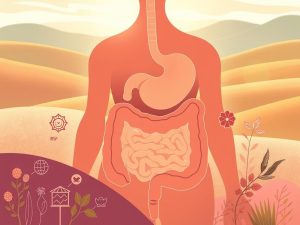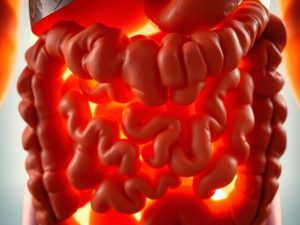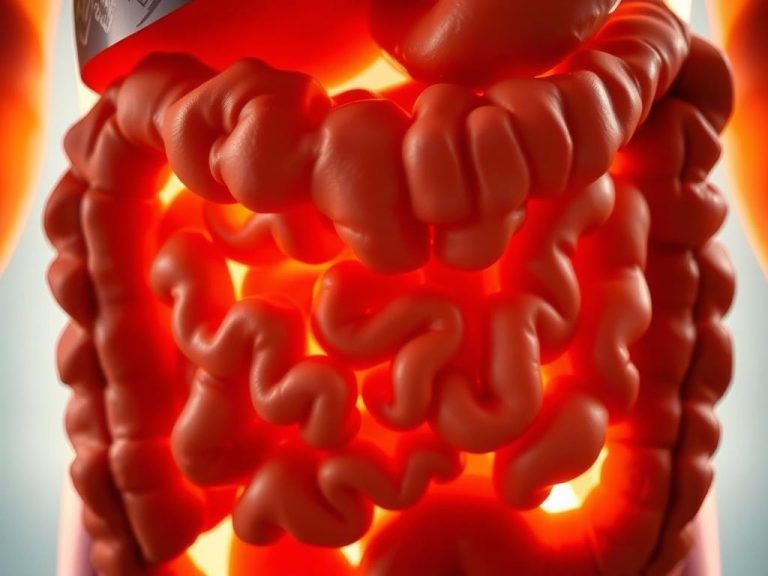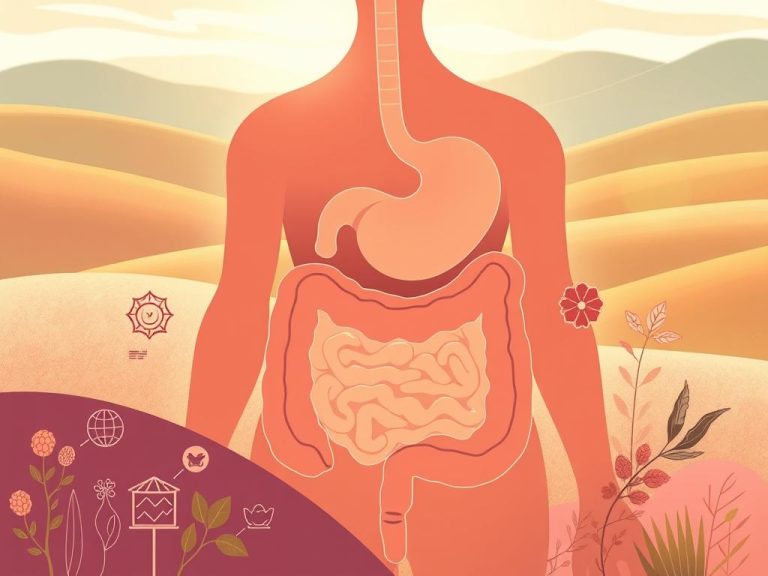Gut Health & Weight Loss: The Surprising Connection You Need to Know
Your gut houses trillions of microorganisms that play a vital role in overall health. These tiny inhabitants do more than aid digestion. They can significantly influence weight management and metabolic processes1.
A healthy gut microbiome boasts diverse bacterial populations. These work together to support optimal body function2. Scientists have found a strong link between gut health and weight loss strategies.
The bacteria in your digestive system affect nutrient processing and fat storage. They also regulate metabolism1. People with diverse microbiomes often manage their weight more effectively2.
Research shows certain bacterial strains influence appetite and energy extraction. They also affect fat storage. A balanced gut microbiome could be key to successful weight loss1.
This link between gut health and body weight offers new ways to manage metabolic wellness2. Understanding gut microbiota can help improve body composition and metabolic function.
Gut health isn’t just about calorie counting. It’s about creating an ideal internal environment for wellness. This approach could revolutionise how we think about weight management.
Understanding the Gut Microbiome and Its Role in Weight Management
Our bodies house a remarkable ecosystem of microorganisms vital for our health. This complex network of bacteria influences metabolism, energy extraction, and weight regulation. A healthy gut microbiome is crucial for maintaining a balanced weight3.
Exploring the Microbial Landscape
The human gut contains up to 100 trillion microbes. These microbes have at least 100 times more genes than the entire human genome3. This microscopic community comprises several key bacterial families:
- Firmicutes
- Bacteroidetes
- Proteus
- Actinomycetes
- Fusobacteria
The Critical Balance of Bacterial Populations
Research shows a link between specific gut bacteria and body weight. Obese individuals typically have a higher ratio of Firmicutes to Bacteroidetes34. Studies reveal that obese people have nearly 90% fewer Bacteroidetes compared to lean individuals3.
Gut Bacteria Metabolism Insights
Gut bacteria play a crucial role in energy extraction and fat storage. Studies with mice have shown fascinating results. Mice with microbiota from obese subjects extracted more calories from food3.
These mice experienced a 47% mean fat gain. In contrast, mice with microbiota from lean subjects only gained 27% fat3.
Diet changes can quickly alter gut bacteria composition. A high-fat, high-sugar diet can change microbial populations within 24 hours. This diet increases Firmicutes and reduces Bacteroidetes3.
The Gut-Brain Connection: How Your Microbiome Affects Food Cravings
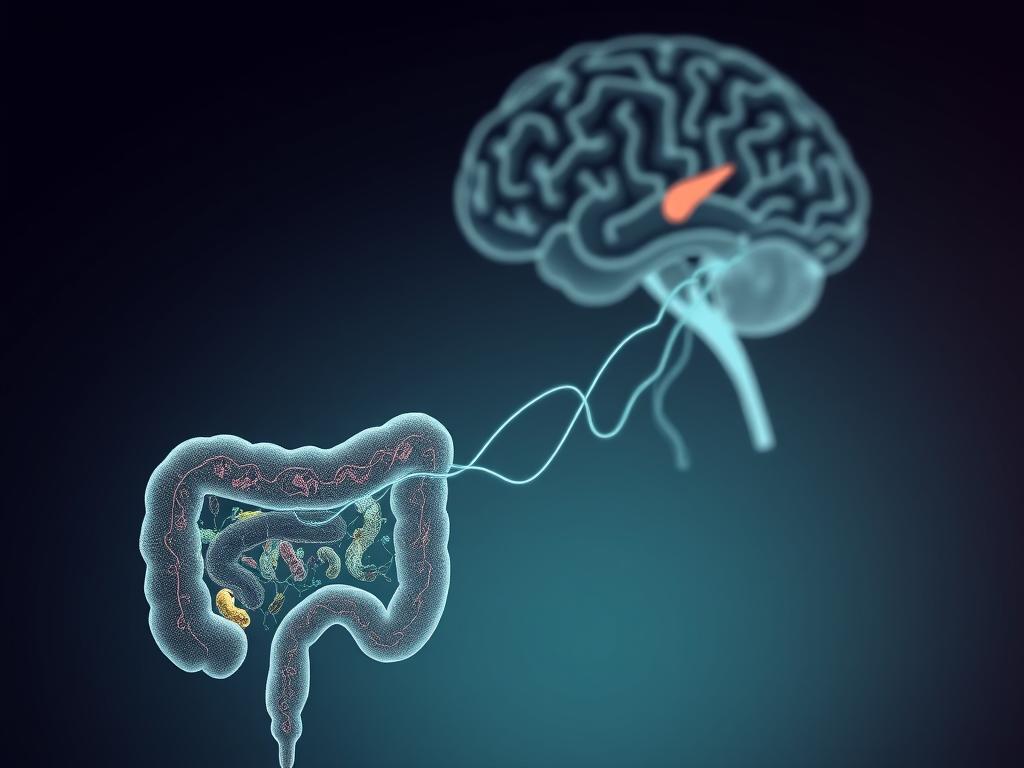
The gut-brain axis is a remarkable communication network. It deeply influences our eating habits and food cravings. Our digestive system houses the enteric nervous system, containing over 500 million neurons5.
Gut bacteria play a vital role in shaping our food preferences. Neurotransmitters produced by these microscopic organisms affect our hunger signals and dietary choices. The gut produces about 90% of the body’s serotonin, crucial for mood and appetite control5.
- The vagus nerve transmits about 80% of signals from the gut to the brain5
- Gut microbiome diversity can reduce high-calorie food cravings by 15%5
- Approximately 70% of individuals with irritable bowel syndrome experience anxiety or depression5
An unbalanced gut microbiome can directly impact food cravings through complex biochemical interactions. The gut-brain connection shows that certain bacteria can manipulate our eating behaviours6.
These bacteria produce hormones and neurotransmitters that trigger specific food preferences. This insight offers a new perspective on managing our dietary choices.
| Gut Bacteria Impact | Potential Influence |
|---|---|
| Acetobacter pomorum | Influences dietary choices |
| Lactobacilli | Modifies food preferences |
| Short-chain fatty acids | Regulates appetite hormones |
Understanding the microbiome’s influence on food cravings can help manage weight and improve health. Nurturing a diverse gut ecosystem may reduce unhealthy food cravings. This knowledge can support individuals on their wellness journey7.
Does improving gut health help with weight loss?
Gut health and weight management are closely linked. Our internal ecosystem impacts body composition. The gut microbiome affects metabolism, fat storage, and overall health8.
Gut bacteria play a vital role in weight management. People with obesity have fewer types of gut bacteria. This difference affects how our body processes nutrients and stores fat8.
The Impact of Gut Bacteria on Fat Storage
Gut bacteria affect fat storage in several ways:
- Metabolic regulation of energy extraction from food
- Influencing hormone production related to appetite
- Modulating inflammation responses9
Inflammation and Weight Gain Connection
Chronic inflammation affects weight management. Some gut bacteria can trigger inflammatory responses. These responses can lead to fat storage and metabolic issues9.
Short-Chain Fatty Acids and Weight Control
Short-chain fatty acids (SCFAs) are produced during fiber fermentation. They send signals about appetite and fullness9. SCFAs can help with:
- Regulate metabolism
- Reduce inflammatory compounds
- Support healthy weight management
| Gut Health Factor | Impact on Weight |
|---|---|
| Bacterial Diversity | Critical for metabolic health |
| Short-Chain Fatty Acids | Supports appetite regulation |
| Inflammation Levels | Influences fat storage |
A personalised nutrition programme focused on gut health showed promising results. Participants lost an average of 9.4 pounds after three months. About 80% reported feeling more energetic8.
A healthy gut microbiome is not just about digestion – it’s a key player in weight management and overall wellness.
Optimising Your Diet for Better Gut Health
A gut-healthy diet supports your microbiome’s diversity and function. Your digestive tract hosts about 200 different bacteria species10. This makes varied nutrition crucial for optimal gut health.
Focus on fibre-rich foods to nourish beneficial bacteria. High-fibre foods positively impact gut microbiome diversity10. Essential food groups include:
- Whole grains
- Legumes
- Fresh vegetables
- Nuts and fruits
Fermented foods are vital for gut health. Kimchi, sauerkraut, yogurt, and kefir contain probiotics that improve microbiome composition10. These foods introduce beneficial bacteria supporting digestive wellness.
Try these strategies to boost gut microbiome health:
- Drink adequate water daily10
- Reduce processed food intake
- Incorporate garlic for microbiome diversity10
| Food Category | Gut Health Impact |
|---|---|
| Fermented Foods | Increases Probiotic Diversity |
| High-Fiber Foods | Supports Beneficial Bacteria Growth |
| Processed Foods | Potentially Harmful to Gut Health |
An imbalanced gut can impair nutrient absorption and cause unintentional weight changes10. Your gut microbiome needs consistent, thoughtful dietary support. Mindful nutrition is key to maintaining this complex ecosystem.
The Role of Probiotics and Fermented Foods in Weight Management
Probiotics for weight loss offer intriguing insights into gut health and metabolism. Scientists are studying the link between our digestive system and body weight. This research brings hope to those struggling with weight management.
Best Probiotic Strains for Effective Weight Management
Several probiotic strains show promise in supporting weight loss efforts:
- Lactobacillus gasseri: Demonstrated significant reductions in body weight, BMI, and visceral fat11
- Lactobacillus curvatus and Lactobacillus plantarum: Linked to reduced body weight and waist circumference11
- Bifidobacterium animalis: Positively affects weight management and reduces inflammation11
Fermented Foods to Boost Gut Health
Fermented foods offer remarkable benefits for weight management. They can help reduce body weight gain and improve insulin resistance. These foods also support metabolic health12.
Some top fermented foods include:
- Kefir: Shown to decrease Firmicutes and increase beneficial bacteria
- Yogurt: Supports metabolic health and reduces body weight
- Fermented blueberry juice: Helps decrease fat accumulation
Probiotic Dosage and Timing Considerations
Consistent consumption and high-quality supplements are key for probiotic effectiveness. Probiotics influence appetite, reduce inflammation, and may inhibit dietary fat absorption11.
Optimal probiotic dosage typically ranges from 1-10 billion colony-forming units (CFUs) daily, but individual needs may vary.
Combining probiotics with regular exercise can boost their weight management benefits11. Always consult a healthcare professional for the most suitable probiotic regimen.
Conclusion
Gut health is crucial for sustainable weight management. It goes beyond simple diet changes, involving overall wellness. Physical activity, stress management, and nutrient-rich foods can boost gut microbiome diversity and metabolism13.
The link between gut health and weight loss is complex yet promising. Microbial diversity plays a key role in metabolism. Lean and obese individuals show significant differences in their gut bacteria14.
An ideal approach includes eating varied plant foods and fermented products. These enhance gut bacterial populations14. Long-term weight control needs a holistic view.
Consistent lifestyle changes can lead to meaningful results. Weight loss efforts have improved gut microbiota diversity. They’ve also reduced intestinal permeability15.
Gut health is vital for overall wellness strategies. Your path to better metabolism and weight control is unique. It requires steady effort, scientific knowledge, and dedication to your internal ecosystem.
FAQ
What exactly is the gut microbiome?
The gut microbiome is a vast ecosystem of microorganisms in our digestive system. These tiny creatures, mainly bacteria, play vital roles in our body. They help with digestion, boost immunity, and regulate metabolism.
How does gut bacteria impact weight loss?
Gut bacteria influence weight loss in several ways. They regulate metabolism and affect how we extract energy from food. These microbes also control inflammation and produce hormones that manage appetite.
Can improving gut health help me lose weight?
Improving gut health can support your weight loss journey. It enhances metabolic function and reduces inflammation. Better gut health may also help control appetite and food cravings.
What foods are best for improving gut health?
Fermented foods like yoghurt and kefir are great for gut health. High-fibre vegetables and whole grains are also beneficial. Legumes and prebiotic-rich foods such as garlic and onions support good gut bacteria.
Are probiotics effective for weight loss?
Some probiotic strains may support weight management, but results vary. Probiotics improve gut health, which could indirectly aid weight loss efforts. However, they’re not a guaranteed solution for shedding pounds.
How long does it take to see changes in gut health?
Significant changes in gut health can take weeks to months. Consistent dietary and lifestyle changes are key. Results may vary based on your current gut health and overall lifestyle.
Can antibiotics negatively affect gut health?
Yes, antibiotics can disrupt the balance of gut bacteria. They kill both harmful and beneficial microorganisms. After antibiotic treatment, focus on rebuilding a healthy gut microbiome.
What are signs of an unhealthy gut?
Common signs include digestive issues like bloating and constipation. Unexpected weight changes and skin irritation may also occur. Fatigue and frequent food intolerances could indicate an unhealthy gut.
How does stress impact gut health?
Chronic stress can harm gut health by altering the microbiome. It increases inflammation and may disrupt the gut-brain connection. This can affect metabolism and weight management.
Can I improve gut health without changing my entire diet?
Small changes can help improve gut health. Try increasing your fibre intake and reducing processed foods. Adding probiotic-rich foods to your diet can also make a difference.
Source Links
- The Surprising Link Between Gut Health and Weight Loss
- Is Gut Health Important for Weight Loss? Exploring the Connection
- The Gut Microbiome and Its Role in Obesity
- Exploring the Impact of the Gut Microbiome on Obesity and Weight Loss: A Review Article
- What To Know About the Gut-Brain Connection
- What is the gut-brain connection?
- Brain–gut–microbiome interactions in obesity and food addiction
- Gut Health and Weight Loss: Do Gut Bacteria Play a Role?
- Beyond the Shots: Focusing on Gut Health Can Aid Weight Loss
- How to Improve and Reset Gut Health
- How Probiotics Can Help You Lose Belly Fat
- Fermented Foods in the Management of Obesity: Mechanisms of Action and Future Challenges
- The Connection Between Gut Health and Weight Loss
- Does gut health affect weight?
- The association of weight loss with changes in the gut microbiota diversity, composition, and intestinal permeability: a systematic review and meta-analysis

